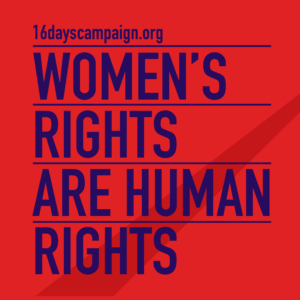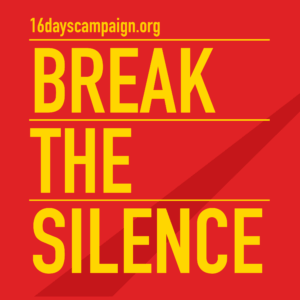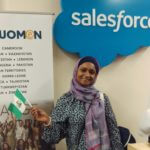Guest post by Fatima Abdulaziz Sule, 2018 fellow of Nigeria
Editor’s note: Each year the Center for Women’s Global Leadership coordinates 16 Days of Activism against Gender-Based Violence, an annual international campaign that began in 1991. The campaign begins on November 25, the International Day for the Elimination of Violence against Women, and runs until December 10, Human Rights Day.
Can we talk about gender-based violence?
 Many decades ago, it was difficult to talk about gender-based violence, but in the recent past, the world is accepting and listening to issues around it. In the wake of the #MeToo, #TimesUp and other historic movements, more light is being thrown on this issue.
Many decades ago, it was difficult to talk about gender-based violence, but in the recent past, the world is accepting and listening to issues around it. In the wake of the #MeToo, #TimesUp and other historic movements, more light is being thrown on this issue.
So, what is gender-based violence exactly?
Gender-based violence (GBV) is defined as violence that is directed against a person on the basis of gender. It constitutes a breach of the fundamental right to life, liberty, security, dignity, equality, non-discrimination and physical and mental integrity between women and men. GBV can take the form of physical, sexual, verbal or psychological abuse, coercion and even educational or financial deprivation [i].
GBV is an issue faced by people all over the world. However, women are disproportionately harmed by it. It has been reported that one out of three women have experienced some form of GBV.
How does GBV affect women and girls?
GBV, a gross violation of human rights, has dire consequences on the lives of women and girls on the whole. These include  health issues (ranging from mental health, sexually transmitted diseases and unwanted pregnancies), and social and economic implications for individuals, families and entire communities.
health issues (ranging from mental health, sexually transmitted diseases and unwanted pregnancies), and social and economic implications for individuals, families and entire communities.
Discrimination and exploitation in the workplace are also problems for women, undermining their educational and work opportunities. In STEM, and indeed across all fields, we need to eliminate the issue of having the fate of a girl’s or woman’s education, work or any other opportunity being tied to exploitation of any sort.
Gender inequality in accessing education is also a problem in some parts of the world. This can be seen where girls are not even given the opportunity to get the education they desire, as girls are pushed away from studying some STEM fields that are termed “masculine.” This creates obstacles and diminished opportunities for girls, unlike their male peers.
So, is GBV something we have the power to prevent?
 Yes, undoubtedly! We have to take action because every woman and girl deserves a life without discrimination.
Yes, undoubtedly! We have to take action because every woman and girl deserves a life without discrimination.
The World Health Organization (WHO, 2019)[ii] outlines primary measures to prevent GBV on different levels:
Societal level: To establish laws that promote gender equity and address GBV. To put in place and facilitate enforcement of laws and policies that address violence against women and promote gender equality, including access to secondary education. Additionally, programs that build the capacity and leadership of women like TechWomen are pertinent.
Community level: Norms that support nonviolence and gender equitable relationships and promote women’s empowerment are required. Addressing societal norms that condone violence against women is fundamental.
Individual level: To have men, boys, women and girls socialized to, and hold, gender equitable attitudes.
Sadly, a WHO report indicates that the majority (55-95%) of women survivors of violence do not disclose or seek any type of services. [iii] In the unfortunate event of GBV occurring, women should seek appropriate care and legal redress. Whatever evidence that is available should also be documented and presented.
What can we do as women in STEM?
Speak up! It is said that your voice is a powerful tool for equality. The #MeToo movement in the film industry has shown how sharing personal experiences can promote conversations leading to change.
Walk the talk: Act and think differently. For change to happen we need a mindset shift to thinking GBV is intolerable and unjustifiable.
In the words of Ban Ki-Moon, Former United Nations Secretary-General, “There is one universal truth, applicable to all countries, cultures and communities: violence against women is never acceptable, never justifiable, never tolerable.”
 Fatima Abdulaziz Sule is a research scientist in the field of Public Health. She serves as a portfolio manager at Viable Knowledge Masters in Nigeria. Fatima is a keen advocate for women and children and believes that every girl deserves access to health and education without discrimination. As a 2018 TechWomen fellow, she was hosted at Veritas Technologies during her time in the Silicon Valley, with remarkably supportive mentors and impact coaches.
Fatima Abdulaziz Sule is a research scientist in the field of Public Health. She serves as a portfolio manager at Viable Knowledge Masters in Nigeria. Fatima is a keen advocate for women and children and believes that every girl deserves access to health and education without discrimination. As a 2018 TechWomen fellow, she was hosted at Veritas Technologies during her time in the Silicon Valley, with remarkably supportive mentors and impact coaches.
[i] Meghan Ott, (2017). https://www.womenforwomen.org/blogs/series-what-does-mean-gender-based-violence
[ii] World Health Organization, 2019: RESPECT women: Preventing violence against women. Geneva: World Health
Organization; 2019 (WHO/RHR/18.19). Licence: CC BY-MC-SA 3.0 IGO.
[iii] World Health Organization, 2019: RESPECT women: Preventing violence against women. Geneva: World Health
Organization; 2019 (WHO/RHR/18.19). Licence: CC BY-MC-SA 3.0 IGO.


I totally agree on the highlighted content on GBV against women and girls.it all starts from the individuals mind and spreads to the rest of the circles.